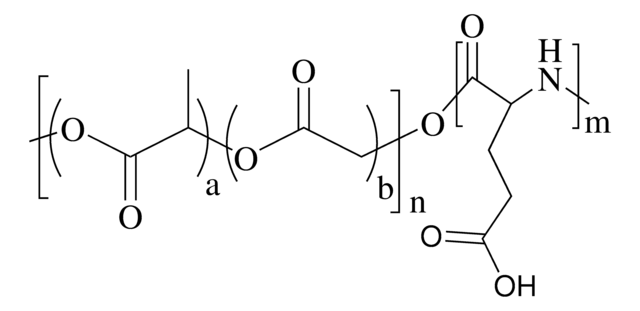900662
Poly(D,L-lactide-co-glycolide)(85/15)-b-poly(ethylene glycol)-carboxylic acid
5k-13k
Synonym(s):
PLGA-PEG, PLGA-PEG Carboxylic acid diblock copolymer, PLGA-PEG-COOH, PLGA-b-PEG
Sign Into View Organizational & Contract Pricing
All Photos(1)
About This Item
Linear Formula:
HO(CH(CH3)COO)x(CH2COO)y(CH2CH2O)nH
UNSPSC Code:
12352106
NACRES:
NA.23
Recommended Products
Application
Biocompatible, amphiphilic block copolymer composed of a hydrophilic PEG block and a hydrophobic Poly(lactide-co-glycolide) (PLGA) block, functionalized with a terminal carboxylic acid. These materials have been used in control release and nanoparticle formulation for drug delivery applications. Well-defined materials with varying properties can be prepared by controlling the relative length of each polymer block. Additionally, the ratio of lactide to glycolide can be tuned to control rate of degradation. Carboxylic acid termination allows for facile further chemical modification of these materials.
Storage Class
11 - Combustible Solids
wgk_germany
WGK 3
flash_point_f
Not applicable
flash_point_c
Not applicable
Certificates of Analysis (COA)
Search for Certificates of Analysis (COA) by entering the products Lot/Batch Number. Lot and Batch Numbers can be found on a product’s label following the words ‘Lot’ or ‘Batch’.
Already Own This Product?
Find documentation for the products that you have recently purchased in the Document Library.
Customers Also Viewed
Miles A Miller et al.
Nature communications, 6, 8692-8692 (2015-10-28)
Therapeutic nanoparticles (TNPs) aim to deliver drugs more safely and effectively to cancers, yet clinical results have been unpredictable owing to limited in vivo understanding. Here we use single-cell imaging of intratumoral TNP pharmacokinetics and pharmacodynamics to better comprehend their
Jijin Gu et al.
Molecular pharmaceutics, 12(8), 2889-2903 (2015-06-24)
The goal of this study was to develop and characterize a novel intravaginal film platform for targeted delivery of small interfering RNA (siRNA)-loaded nanoparticles (NP) to dendritic cells as a potential gene therapy for the prevention of sexually transmitted human
Soroush Ardekani et al.
Scientific reports, 5, 16258-16258 (2015-11-21)
Nitroglycerin (NTG) markedly enhances nitric oxide (NO) bioavailability. However, its ability to mimic the anti-inflammatory properties of NO remains unknown. Here, we examined whether NTG can suppress endothelial cell (EC) activation during inflammation and developed NTG nanoformulation to simultaneously amplify
Our team of scientists has experience in all areas of research including Life Science, Material Science, Chemical Synthesis, Chromatography, Analytical and many others.
Contact Technical Service







